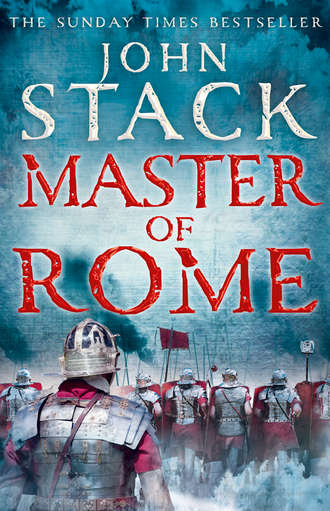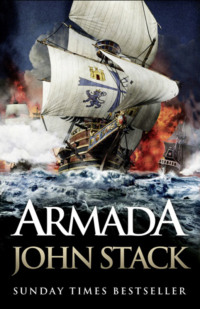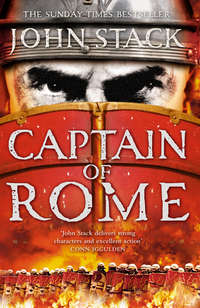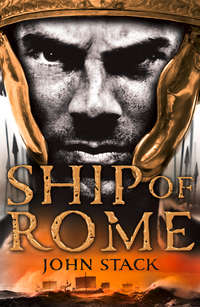
Полная версия
Master of Rome
‘They are Roman,’ Hamilcar shot back. ‘And their lives are forfeit to the whim of Carthage.’
Regulus made to retort but again he held his tongue, sensing that to antagonize the Carthaginian further was to risk the lives of the five hundred legionaries who had been captured with him. He repeated the number in his mind. Five hundred out of an army of twelve thousand. He whispered a prayer to Mars, the god of war, as he struggled to keep the burden of the terrible loss hidden from his enemy.
‘You are defeated, Roman,’ Hamilcar said, as if reading Regulus’s thoughts. ‘Your army is no more and your invasion is finished.’
‘Is that why you have come here, Carthaginian?’ Regulus retorted. ‘To tell me this. To mock me?’
‘No,’ Hamilcar replied, stepping forward once more until he stood over Regulus. ‘Your light infantry escaped our grasp at Tunis and have fled to Aspis. I have come here to demand you order those forces to surrender.’
‘Surrender?’ Regulus scoffed. ‘The fleet at Aspis will already have evacuated them. There will be no surrender.’
‘You are wrong, Roman,’ Hamilcar replied, the arrogance of the proconsul stirring his anger. ‘The port is blockaded and your fleet is trapped, and if you do not order those men to surrender, I will kill every last one of them.’
Regulus was stunned into silence, his mind racing to devise an alternative.
‘You have until tomorrow to decide,’ Hamilcar said, and he turned and left the room, Xanthippus following without a backward glance.
Regulus stood up as the door was closed, the room once more plunging into semi-darkness. He breathed in deeply, trying to clear his thoughts, but the warm air caught in his throat and he coughed violently. He reached out instinctively for the amphora and picked it up, remembering immediately that it was empty, and he threw it at the wall in anger, the clay shattering into a dozen pieces.
Over a year ago he had sailed south in triumph from Cape Ecnomus. He had met the Carthaginian army at Adys and swept them aside, had taken Tunis without a fight and had plundered the land around Carthage. The war was won, the enemy beaten on all fronts and, conscious that his consulship was nearing its end and that a successor could arrive any day from Rome to steal his victory, he had confidently sent envoys to Carthage with his terms for their surrender: abandon Sicily, disband the navy and admit total defeat.
Even now Regulus remembered the anger he had felt when the Carthaginians refused his terms. Thereafter he had spent every waking hour preparing his army for the moment the enemy would dare to step outside the city. They had emerged, a new leader at their head, and Regulus had marched on to the plains south of Tunis, ready to deliver the fatal blow that would finally subdue the Carthaginians.
But that victory had been snatched from him, replaced with ignominious defeat, and Regulus cursed Fortuna for the ruination of his fate. He strode to the shuttered window and squinted through a crack in the timber to gaze at the city of Tunis spread out before him. In the distance, a dark pall of smoke rose from the plain, the funeral pyre of the battlefield, and Regulus whispered a prayer once more for the lives of twelve thousand men.
‘We should attack now,’ Xanthippus said as he followed Hamilcar across the battlements, ‘before the enemy becomes entrenched.’
‘No, I cannot risk the destruction of the Roman fleet. I need those galleys intact. We will wait,’ Hamilcar replied, turning to look out from the heights of the fortress over the city of Tunis, the late evening sunlight reflecting off the taller buildings. His gaze settled on the pillar of smoke to the south, its tentacles reaching towards the city, borne on by the eternal wind, the ghibli. The fires had been burning since dawn the day before, when Hamilcar had witnessed the lighting of the pyres under the Carthaginian slain, their bodies ceremoniously committed to Mot, the god of death, while nearby the Roman carrion were put to the torch, a separate fire to which Hamilcar had added ten more bodies – those of the members of the council of Tunis who had opened the gates of the city to the Romans.
‘You think this Roman will order his men to surrender?’ Xanthippus asked, following the Carthaginian’s gaze.
‘Regulus will comply,’ Hamilcar said with certainty. ‘He knows their situation is hopeless.’
‘Then surely those men know it too,’ Xanthippus replied. ‘Perhaps they have already surrendered.’
Hamilcar turned to the Spartan, a smile on his face. ‘They have not surrendered,’ he said. ‘Nor will they under force of arms.’
‘You are sure?’ Xanthippus said.
Hamilcar nodded. ‘I am sure,’ he replied. ‘For I know the resolve of the man who commands there.’
Over the previous year, Hamilcar had been determined to discover the identity of the lone captain who had frustrated his attack at Ecnomus. Learning that he had survived and had been promoted for his actions, Hamilcar had burned the man’s name into his mind, searching for it in every spy’s report that crossed his desk, tracking his movements during the course of the campaign, waiting for an opportunity to avenge his defeat at Ecnomus.
‘Who is this Roman?’ Xanthippus asked, seeing the expression of hostility on the Carthaginian’s face.
‘He is not Roman, he is Greek, like you,’ Hamilcar said, the words spoken slowly as the strength of his conviction coursed through him. ‘And when I have Regulus’s order, I will deliver it to this man and accept his surrender personally.’
Hamilcar turned from Xanthippus and looked to the east, the horizon rapidly slipping into darkness as the sun fell away in the west. In his mind’s eye he pictured the port of Aspis and the enemy within, his mouth forming the name of his foe. Perennis.
Atticus ran his hand along the forerail of the Orcus as he stared out across the thousand yards to the Carthaginian blockade, the two hundred dark-hulled quinqueremes slowly taking shape in the dawn light. He looked to the galleys of his command, each one with its bow facing the mouth of the harbour, the outgoing tide stretching their stern anchor lines behind them as if the ships themselves were eager to be let loose on the enemy after four days of silently watching the Carthaginian galleys.
‘Dawn, at last,’ Septimus said as he came up to the foredeck, his eyes red-rimmed from lack of sleep, his face darkened by stubble.
Atticus nodded, the tension in his stomach easing, feeling the same relief at the sight of the rising sun. He had spent the night on deck, as had all his crew for the past four nights, ready for an attack that had never come, silently watching the Carthaginian running lights sweep slowly across the horizon under the star-filled, moonless sky, the enemy visibly holding station.
‘Day five,’ Atticus remarked, frustration in his voice.
‘And still no advance,’ Septimus said, finishing his friend’s thought. ‘You’re still sure they’ll attack at night?’ he asked after a moment’s pause.
‘I would,’ Atticus replied. ‘The confines of the harbour protect our flanks and reduce their advantage in numbers. They could attack by day but it would be a costly victory. A surprise attack at night would be their best bet.’
Septimus nodded, knowing also of the terrifying confusion that would accompany a night attack, chaos that would be an ally to the aggressors. He looked to the rising sun and then to the enemy, their formation the same as it had been when he last saw it at dusk the evening before. He tightened his grip on the hilt of his sword and silently muttered a challenge to the Carthaginians, daring them to make their play.
The bireme moved quickly through the swarm of larger galleys, the helmsman giving way to the towering quinqueremes as he skilfully exploited the agility of the smaller ship. Hamilcar stood beside him at the tiller, watching the crewman at work, admiring the display of prowess, a skill Hamilcar suspected had been taught to the helmsman by his father or grandfather in the tradition of all Carthaginian naval families.
Hamilcar looked to the multitude of galleys surrounding him, noticing their clean lines and ordered formation, the efficiency of the crews clearly evident even after five days of monotonous duty. The bireme progressed smoothly and Hamilcar glanced to his right, catching glimpses of the inner harbour of Aspis between the moving galleys, the stationary Roman ships indistinguishable across a thousand yards of water. A shouted hail caught his attention and he looked to the fore once more, the familiar galley ahead a welcome sight.
The bireme moved swiftly alongside the Alissar and, as it nudged the hull, Hamilcar jumped on to the rope ladder and ascended to the main deck.
‘Well met, Commander,’ Himilco the captain said as he extended his hand.
Hamilcar took it. ‘Report, Captain,’ he said brusquely.
‘As you predicted, Commander,’ Himilco began. ‘The Romans have made no move to surrender.’
Hamilcar smiled grimly and nodded, looking once more to the inner harbour, his view now unobstructed. The sight prompted him to reach into his tunic and he took out a brass cylinder, fingering it lightly as he turned once more to Himilco.
‘Come about, Captain,’ he ordered. ‘Take us in to the harbour.’
‘We are to attack?’ Himilco asked.
‘No, signal the fleet. Tell them to hold station: we go alone.’
Himilco saluted and within moments the Alissar broke formation and turned her bow to the inner harbour. Hamilcar looked to the cylinder in his hand, his expectation tightening his grip on the container. Within minutes he would finally be able to put a face to his enemy.
‘Carthaginian galley approaching,’ Corin called from the masthead, and Atticus looked to the outer harbour, the lone galley’s oars falling and rising slowly, the formation of enemy ships behind her unchanged.
‘An envoy?’ Septimus suggested. Atticus nodded.
‘But why now?’ he asked, and turned to look for his second-in-command. ‘Baro, get us under way. Signal the other galleys to make ready but to hold station.’
Baro nodded and the Orcus moved off at steerage speed before Gaius, the helmsman, brought her up to standard. Atticus and Septimus moved to the foredeck, the centurion ordering a contubernia of ten legionaries to accompany them, and both men lapsed into silence as they watched the opposing galley approach.
The two galleys approached each other warily, as if manoeuvring for position, the helmsmen testing each other’s skill. The Carthaginian ship was first to slow its advance and her oars dropped neatly into the water, their combined drag bringing the quinquereme to a halt within a half-ship length before two oars re-engaged fore and aft to keep the galley steady in the gentle current. Atticus turned and nodded down the length of the galley. Gaius acknowledged the gesture and carried out the same manoeuvre with similar ease; as the two ships covered the remaining distance, in silence now that the drum beat had halted, Atticus stared across at the group of armed men standing on the enemy foredeck.
Two Carthaginians stepped forward and Atticus and Septimus responded in kind, moving to the starboard forerail as the galleys kissed with a heavy thud, the timber hulls grinding against each other, each moving independently in the swell as the oars maintained the connection. Atticus focused his attention on the taller of the two Carthaginians, noticing how the other deferred to him. He was of a similar age to Atticus but his bearing was that of an older man, his self-assurance clearly evident in his expression. He stood with his shoulders slightly stooped as if poised to charge. Atticus made to address him but the Carthaginian spoke first.
‘You are Perennis?’ he asked.
Atticus was taken aback. ‘You have me at a disadvantage, Carthaginian,’ he said, and waited for the officer to introduce himself.
The Carthaginian smiled, as if relishing a private joke. ‘I am Hamilcar Barca,’ he said, and again Atticus was stunned. ‘You know of me,’ Hamilcar said.
‘I know of you, Barca,’ Atticus replied coldly. ‘You were the commander of the quinquereme that escaped Tyndaris.’ The memory formed quickly in his mind and he felt Septimus shift restlessly beside him, the centurion’s anger stirred at the discovery of whom they were addressing, remembering the desperate fight at Tyndaris that had cost him so many of his men.
‘And you, Perennis, were the commander of the trireme that attacked this ship at Ecnomus,’ Hamilcar replied, uttering the words to stoke the fire of his anger.
There was a moment’s silence.
‘What have you to say, Barca?’ Atticus asked, an edge to his voice, keen to forestall any inconsequential talk and draw the line of battle between them.
‘I have come here to offer you terms of surrender,’ Hamilcar said, struggling to control his temper at the Greek’s arrogant tone.
‘There will be no surrender, Barca. Not at Aspis.’
‘The Roman invasion of my country is finished, Perennis. Your pitiful force cannot stand alone.’
‘It will stand as long as I am in command,’ Atticus replied defiantly.
‘But it is not you who commands here, Perennis,’ Hamilcar smiled, and he tossed a brass cylinder across the gap between the galleys.
Atticus snapped it from the air and opened it, drawing out the scroll within. He broke the seal and quickly read the contents, immediately recognizing the handwriting from earlier dispatches. His mouth twisted in anger.
‘What is it?’ Septimus asked, noticing his friend’s agitation. Atticus handed him the scroll without comment and Septimus glanced through it. ‘An order to surrender?’ he said in disbelief.
Atticus nodded. ‘From the proconsul himself,’ he spat, knowing now why the Carthaginians hadn’t attacked over the previous days. He took the scroll from Septimus and read it through again in an effort to detect a subtext to the proconsul’s order, some sign that the order was written under duress and his true intent was for the fleet to resist the Carthaginians. There was none. The order was explicit.
‘Regulus knows of the blockade,’ Hamilcar said to compound the order, to gain the Greek’s surrender immediately by justifying the proconsul’s decision. ‘Given the odds, he has realized you can surrender with honour.’
Atticus looked up and stared at Hamilcar with an expression of disdain. ‘With honour?’ he said sarcastically. ‘There’s no honour in being chained to a galley oar.’
‘Nevertheless,’ Hamilcar said impatiently. ‘You have your orders, written by your own commander. You must surrender now.’
Atticus looked to the blockade and then to Septimus, the centurion’s defiant expression a reflection of his own conviction. He nodded slightly, and Septimus returned the gesture, in full agreement with his friend.
Atticus carefully placed the scroll back inside the cylinder and turned once more to Hamilcar. ‘There will be no surrender,’ he replied, and before Hamilcar could protest, Atticus dropped the cylinder over the side, the brass container striking the hull with a hollow clang before splashing into the water.
Hamilcar followed its fall, the gesture triggering a cacophony of conflicting voices in his mind. He looked up and focused once more on the Greek commander, his vision narrowing as the dispute inside him intensified. His pride called for immediate attack, to humble the insolent Greek and give his own men the victory their morale so desperately needed after the defeat at Ecnomus. But reason called for restraint, knowing he needed the forty Roman galleys to strengthen his depleted navy; to take them by force would cost him as many galleys as he would gain. He breathed deeply and forced his pride to yield, deciding to give the Greek one last chance, putting the needs of Carthage ahead of his own honour. He leaned forward over the forerail of the Alissar.
‘Hear me, Perennis,’ he said, suppressed hostility hardening his voice. ‘I will give you twenty-four hours to reconsider your decision.’
Atticus made to retort, but Hamilcar raised his hand to forestall him, no longer trusting his own temper, knowing that further words from the Greek might cause him to abandon his restraint.
‘Comply, Perennis, and you and your crews will live,’ he said. ‘Defy me and – I swear by my gods – you will all die.’
Hamilcar stepped back and turned, issuing orders for the Alissar to withdraw. Her oars were re-engaged, the ship turning neatly away.
Atticus watched the galley retreat, the Carthaginian’s ultimatum weakening his previously unassailable defiance. With Barca in command, the odds against him were now greater than ever. He tried to suppress his uncertainty, knowing that Fortuna alone controlled his fate and he would rather die facing the enemy than live as a slave. He turned to order Baro to get the Orcus under way, but as he did the wind suddenly ebbed and slackened, allowing, for the first time, the drum beats of the Carthaginian blockade to be heard. It was a staccato beat, two hundred strong, like the sound of oncoming thunder, a presage of the storm that was poised to break over Aspis.
CHAPTER TWO
Marcus Aemilius Paullus strode purposefully across the main deck of the Concordia, ignoring the salutes of the soldiers he passed on his way to the side rail. He looked out over the fleet, the three hundred and fifty galleys of the Classis Romanus spread out in formation behind his flagship, and his heart swelled, the sight overwhelming him, the power of his command filling him with pride.
As senior consul, Paullus had rushed to Sicily six months before, taking residence in the walled city of Agrigentum on the southern coast. From there he had sought to take command of the war in Sicily, to carve out a victory that would rival his predecessor’s triumph at Cape Ecnomus; but the enemy had withdrawn their naval forces south to Carthage and Paullus lacked the legionary army necessary to take the fight to the Carthaginians on land. He had led skirmishes to Panormus and Lilybaeum, the two main Carthaginian-held ports of Sicily, hoping to take the fight to the enemy, but his minor victories only served to deepen his frustration.
All eyes in Rome were on the conflict in Africa. There lay the glory, but Regulus had persistently evaded all efforts to recall him to Rome, his victories at Ecnomus and Adys giving him considerable support in the Senate, so he had maintained his position as commander of the expeditionary force. With defeat in Tunis, however, that command was no more, and Paullus couldn’t suppress his rising anticipation. When news of Regulus’s defeat had arrived from a supply ship that had escaped the harbour of Tunis, Paullus had immediately assembled the fleet to sail west, eager to take full advantage of his restored mandate.
Paullus made his way slowly to the aft-deck, surreptitiously watching the crew at work as he went, their frantic pace at odds with the consul’s unhurried movements. The consul had never before been on a galley sailing to Sicily but, over the previous months, he had learned all that was necessary to command a fleet, his two victorious skirmishes against the enemy confirming his belief in his natural ability to lead.
Paullus turned to look out over the length of the Concordia as he reached the aft-deck. The mainsail was taut against the rigging and, beyond that, the corvus boarding ramp stood poised. He breathed in the warm crosswind and looked across the deck. The junior consul, Servius Fulvius Paetinus Nobilior, was standing by the tiller and he nodded at Paullus, the senior consul returning the gesture before turning once more to the sea ahead, his mind already focused on his plan of attack once he reached Aspis. Audacity was the key to victory, and Paullus smiled as he imagined the fear that would sweep across the sea-lanes as news of his arrival spread.
The horizon before the Concordia darkened, a shoreline came slowly into view, and the call of land sighted echoed across the fleet. Paullus moved quickly to the foredeck, giving himself an uninterrupted view of the seascape and the shoreline beyond. A flicker of colour caught his eye and he focused on the intermittent movement. The crosswind caused his eyes to water and he rubbed them irritably. He saw them again, flashes of vibrant colours, stark against the dark shoreline, and he suddenly understood what he was seeing, the vivid masthead banners whipping furiously in the wind, their number growing with each oar stroke the Concordia took to narrow the distance. An instant later the lookout’s call confirmed his sighting.
‘Enemy galleys, dead ahead!’
‘Number and heading,’ Hamilcar roared as he ran the length of the Alissar.
‘At least three hundred,’ the lookout called. ‘Heading due west, directly for us.’
Hamilcar stopped as he came to the aft-deck and looked east to the approaching galleys. But for their masthead banners they could be Carthaginian ships, their design a copy of the galleys constructed by the master shipbuilders of Carthage, and Hamilcar cursed the sight. He looked over his shoulder to the inner harbour of Aspis and the forty Roman galleys that still faced him defiantly.
The deadline he had imposed was but hours away, and he reproached Tanit for her fickle nature. Many times during the preceding night he had been tempted to retract his proposal and order a full attack. He knew that tactically it would be a mistake, but his honour demanded a measure of retribution for the defeat inflicted on him and his men at Ecnomus. The Alissar had been his command ship on that day, the quinquereme in the vanguard of the main attack, a position of honour that Hamilcar had assumed with pride but one which had become forever tainted with humiliation when he had ordered the Alissar to lead the retreat from Ecnomus.
Many of the galleys of the blockade had been in battle that day and, even a year later, the shock of defeat still lay heavy on the morale of the crews, another reason why Hamilcar had been tempted to attack Aspis. A fight in the inner harbour would be on the Romans’ terms, and Hamilcar’s gains would be negated by his losses, but success was nevertheless assured by numbers alone. Hamilcar knew his men needed a victory over the hated Roman fleet that many perceived to be indomitable.
He had been racked with indecision during the night, perhaps touched by the same lack of confidence that was endemic in his fleet. Now fortune had swung against him, punishing him for his hesitancy, and Hamilcar looked once more to the east and the approaching Roman galleys, a quiet determination stealing over him.
The proximity of combat cleared his mind of any further thoughts of what might have been. He was outnumbered, and the enemy was on two sides. He could not hope to hold his position at the mouth of the harbour. Defeat would be certain. Equally he couldn’t order his fleet to disperse, knowing that fleeing before a blow had been struck would be the death knell of his command.
He would have to take the fight to the Romans, but first he needed to reduce the odds against him. He closed his eyes and pictured the surrounding coastline in his mind’s eye, searching his store of local knowledge of the shores around his beloved Carthage. He opened his eyes and checked the height of the tide on the nearby shoreline. He looked to the north, his mouth hardening into a thin line, his previous hesitation forgotten, and he turned to the helmsman.
‘Come about,’ he ordered. ‘Battle speed. Signal the fleet to form up on the Alissar. We sail for Cape Hermaeum.’
The helmsman nodded and sent a runner to signal the fleet as he put his weight behind the tiller, the quinquereme responding instantly to the rudder as the galley broke the formation of the blockade. Hamilcar leaned into the turn, his hand on the siderail as the drum beat intensified, the Alissar increasing speed to eight knots within a ship-length while all around him the galleys of his command responded in kind.
‘Aspect change on the blockade!’
‘All hands, make ready,’ Atticus shouted at the lookout’s call, quickly running to the foredeck to see the course change of the blockading galleys for himself. He stood poised to issue the order for battle stations, expecting to see the Carthaginians turning into attack, but instead their bows swung north, the blockade rapidly disintegrating.






